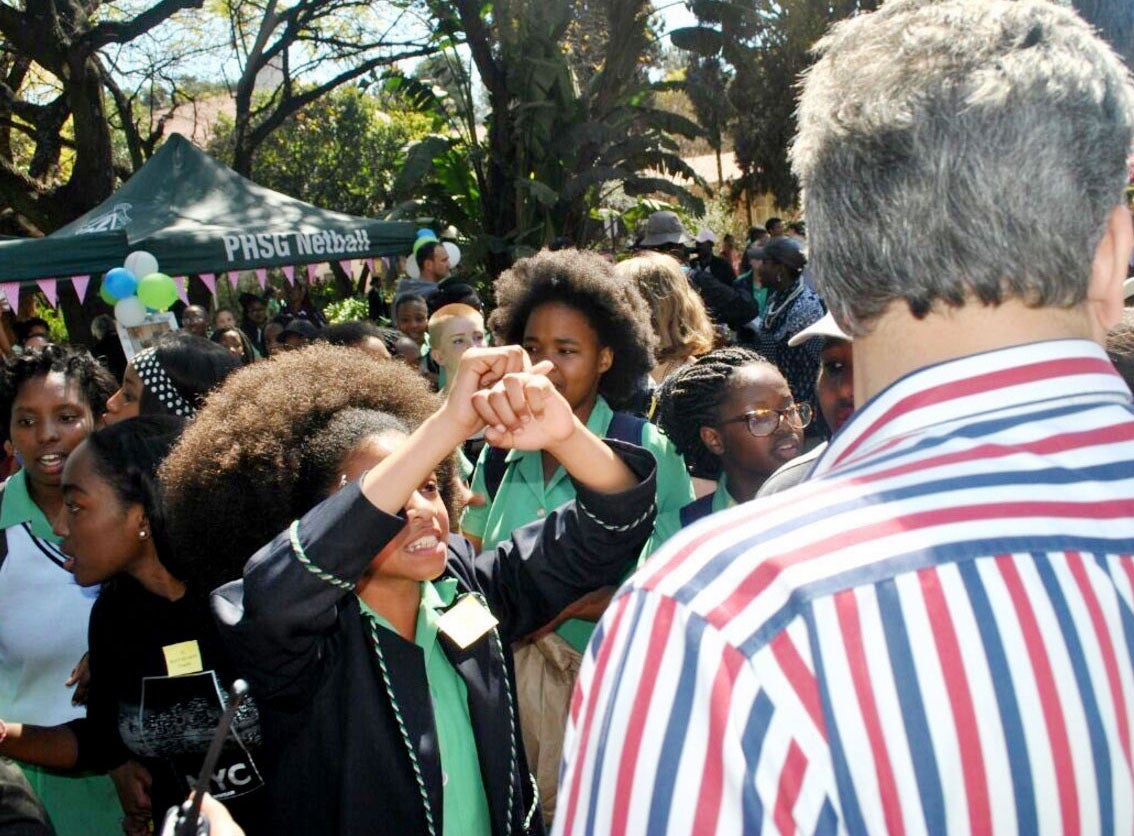
Getting your Trinity Audio player ready…
In short: these white policy makers are under the impression that the kinks and coils their students were born with somehow hinder the ability to learn. Yes, it’s as ridiculous as it sounds. The people of this community are banding together to protest such outdated assumptions and thanks to the Twitter hashtag #StopRacismAtPretoriaGirlsHigh, we’re able to stand in solidarity with them:School rules forbid us from speaking our home languages during school hours. 'No foreign languages' it read. #StopRacismAtPretoriaGirlsHigh
— Yelwa (@_Yelwa) August 28, 2016
The sign reads: "Only a fool would let his oppressor educate his children." #StopRacismAtPretoriaGirlsHigh pic.twitter.com/Aas6ofmdZe
— Philip Lewis (@Phil_Lewis_) August 29, 2016
YAS to the young women in South Africa protesting the right to wear Afros to school #StopRacismAtPretoriaGirlsHigh pic.twitter.com/UorVM0CHIQ
— The Dinner Table Doc (@dinnertabledoc) August 29, 2016
As of now, there are also close to 30K signatures on a petition titled “Stop Racism at Pretoria Girls High,” demanding reform from administrators. “The system did not allow for black girls to have Afros,” said a former student to a local reporter. “It wasn’t written in the code of conduct, but they tell you that your hair is very untidy and it’s not appropriate. If your hair is neatly tied and your Afro is neatly tied, why must you be apologetic for being a black, African child in South Africa?”Some superheroes don't wear capes, they proudly wear their natural hair. #stopracismatpretoriagirlshigh pic.twitter.com/v4qFJC8hPj
— Donovan Goliath (@DonovanGoliath) August 29, 2016
This is predictably infuriating. Although discrimination against POCs is nothing new, as of late, we’ve witnessed several cases of black people’s hair being policed at work or school. Earlier this month, a man in Trinidad & Tobago almost lost his job when the HR department cited his “unprofessional” hair as a distraction. In late 2015, a North Carolina news anchor posted a video to her Facebook page, where an intern was advised to keep her curly hair straight as a way to appease employers. The proof is in the pudding: this goes beyond vanity and whether our hair is seen as attractive or otherwise. Today, in 2016 (!!), racist policies have a direct effect on our education, careers and self-worth. How are we expected to excel and thrive when those we work or co-exist with are telling us that our God-given features aren’t acceptable?! It’s devastating to know that it sometimes takes cases like this to remind me of the privilege I experienced growing up in an environment where my hair was seen as beautiful, not repugnant. And this is coming from a black woman who was raised under the tutelage of a white mother. It’s sad that moments like these revive the lingering sting of melanin-deprived celebrities being seen as “cutting edge” or “trend-setting” when they appropriate a style born out of our culture. This is why we point them out. If we don’t, our identity and rich history is tampered with and consequently, inaccurate for future generations. Where do we go from here? How do we dismantle and rebuild the standards of beauty set by the powers that be? We take that power back by changing the perception of what professional and polished looks like. It’s okay to wear your afro to work. It’s also okay to rock a blowout. The hairs atop our head have no direct correlation to the work we’re capable of doing. Ultimately, the work starts within our community. By supporting each other and consistently bringing stories like this to the forefront, we can muster up the collective bravery needed to redefine these ridiculous norms. This vicious cycle is enough to make me want to pull out my hair. But I won’t do that — it’s much too beautiful to lose.Tiisetso Phetla former pupil at the school says, she experienced this #StopRacismAtPretoriaGirlsHigh pic.twitter.com/QsTlSf9rTw
— Zikhona Tshona (@ZikhonaTshona) August 29, 2016